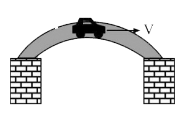Keeping the angle of banking, if the radius of curvature is made four times, the percentage increase in the maximum speed with which a vehicle can travel on a circular road is
25%
50%
75%
100%
The correct Answer is:D
To solve the problem, we need to understand the relationship between the radius of curvature, the angle of banking, and the maximum speed of a vehicle traveling on a circular road.
1. Understanding the Formula for Maximum Speed:
The maximum speed V for a vehicle on a banked circular road is given by the formula:
V=√R⋅g⋅tan(θ)
where:
- R is the radius of curvature,
- g is the acceleration due to gravity,
- θ is the angle of banking.
2. Initial Speed Calculation:
Let the initial radius of curvature be R and the initial maximum speed be V1:
V1=√R⋅g⋅tan(θ)
3. New Radius of Curvature:
If the radius of curvature is made four times, the new radius R′ is:
R′=4R
4. New Speed Calculation:
The new maximum speed V2 with the new radius of curvature is:
V2=√R′⋅g⋅tan(θ)=√4R⋅g⋅tan(θ)=√4⋅√R⋅g⋅tan(θ)=2V1
5. Calculating the Increase in Speed:
The increase in speed from V1 to V2 is:
V2−V1=2V1−V1=V1
6. Percentage Increase in Speed:
The percentage increase in speed is calculated as:
Percentage Increase=(V2−V1V1)×100=(V1V1)×100=100%
Conclusion:
The percentage increase in the maximum speed with which a vehicle can travel on a circular road, when the radius of curvature is made four times while keeping the angle of banking constant, is 100%.
The maximum speed V for a vehicle on a banked circular road is given by the formula:
V=√R⋅g⋅tan(θ)
where:
- R is the radius of curvature,
- g is the acceleration due to gravity,
- θ is the angle of banking.
Let the initial radius of curvature be R and the initial maximum speed be V1:
V1=√R⋅g⋅tan(θ)
If the radius of curvature is made four times, the new radius R′ is:
R′=4R
The new maximum speed V2 with the new radius of curvature is:
V2=√R′⋅g⋅tan(θ)=√4R⋅g⋅tan(θ)=√4⋅√R⋅g⋅tan(θ)=2V1
The increase in speed from V1 to V2 is:
V2−V1=2V1−V1=V1
The percentage increase in speed is calculated as:
Percentage Increase=(V2−V1V1)×100=(V1V1)×100=100%
The percentage increase in the maximum speed with which a vehicle can travel on a circular road, when the radius of curvature is made four times while keeping the angle of banking constant, is 100%.
Topper's Solved these Questions
- BOOK - DC PANDEY ENGLISHCHAPTER - CIRCULAR MOTIONEXERCISE - Taking it together67videos
CIRCULAR MOTION
- BOOK - DC PANDEY ENGLISHCHAPTER - CIRCULAR MOTIONEXERCISE - Match the columns3videos
CIRCULAR MOTION
- BOOK - DC PANDEY ENGLISHCHAPTER - CIRCULAR MOTIONEXERCISE - Integer7videos
CIRCULAR MOTION
- BOOK - DC PANDEY ENGLISHCHAPTER - CENTRE OF MASS, LINEAR MOMENTUM AND COLLISIONEXERCISE - Level 2 Subjective21videos
CENTRE OF MASS, LINEAR MOMENTUM AND COLLISION
- BOOK - DC PANDEY ENGLISHCHAPTER - COMMUNICATION SYSTEMEXERCISE - Only One Option is Correct27videos
COMMUNICATION SYSTEM
Similar Questions
Obtain an expression for the maximum speed with which a car can turn safely on a banked road.
View SolutionA vehicle is moving on an over bridge which is in the form of a circular arc of radius 10 m. What is the maximum speed with which a vehicle can move through the topmost point on the bridge without losing contact with the bridge ? (g=10m/s2)
 View Solution
View Solution
Knowledge Check
- Question 1 - Select One
Keeping the banking angle same, to increase the maximum speed with which a vehicle can travel on the curved road by 10%, the radius of curvature of the road has to be changed from 20 m to
A16 mB18 mC24.2 mD30.5 m - Question 2 - Select One
The coefficient of friction between the tyres and the road is 0.1. The maximum speed with which a cyclist can take a circular turn of radius 3 m without skidding is (Take g=10ms−2)
A√15ms−1B√3ms−1C√30ms−1D√10ms−1
A bus of mass 1000 kg has an engine which produces a constant power of 50 kW. If the resistance to motion, assumed constant is 1000 N. The maximum speed at which the bus can travel on level road and the acceleration when it is travelling at 25 m/s, will respectively be -
View SolutionThe maximum tensoin that an inextensible ring of radius 1 m and mass density 0.1 kg m−1 can bear is 40 N. The maximum angular velocity with which it can be rotated in a circular path is
View SolutionAn automobile enters a turn of radius R. If the road is banked at an angle of 45∘ and the coefficient of friction is 1, the minimum and maximum speed with which the automobile can negotiate the turn without skidding is :
View SolutionA car of mass m is moving on a level circular track of radius R if μs represents the static friction between the road and tyres of the car, the maximum speed of the car in circular motion is given by.
View SolutionThe maximum acceleration of a particle un SHM is made two times keeping the maximum speed to be constant. It is possible when .
View SolutionThe maximum acceleratioin of a particle in SHM is made two times keeping the maximum speed to be constant. It is possible when
View Solution

